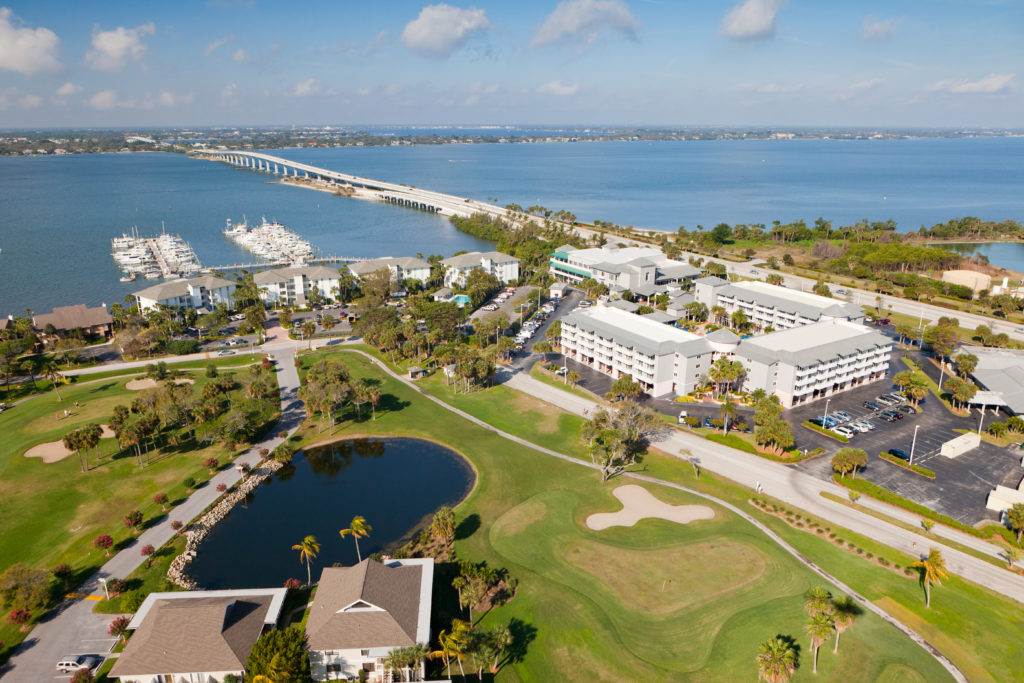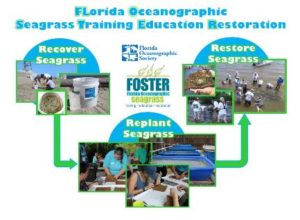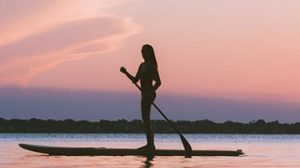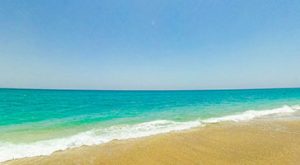Protecting Our Paradise
Martin County is investing in sustainability!
Martin County has adopted a single-use plastic reduction strategy to protect the health of our waterways and the environment. How can you help make a difference? Shop local vendors that support sustainability practices, join advocacy groups with missions you support and, most importantly, incorporate reduction strategies into your everyday routine.
At present, global plastic production is equivalent to hundreds of millions of tons per year and is predicted to double within the next 10 years. Less than one fifth of all plastic is recycled. Approximately 40 percent of all plastic produced is single-use, disposable plastics. These plastics include non-biodegradable beverage bottles, plastic bags, packaging, food containers and plastic straws. Each year an estimated 10 million tons of plastic enters the ocean mostly from land. This plastic waste stream joins the approximately 150 million tons of debris that are caught up in the world’s ocean currents forming massive collections of marine trash. Eventually, as the plastic is exposed to the elements, it breaks down into smaller pieces that are consumed by marine life in place of food, causing starvation and death.
Plastic waste can sicken or kill coral reefs by blocking sunlight from reaching the coral or by abrading the coral and introducing pathogens and infection. We now know that microplastic fibers have contaminated virtually all the world’s water and the health implications of consumption are not yet fully understood.
Plastic pollution that collects locally on the beaches, shorelines and waterways impacts the health and aesthetic beauty of our environment. Litter is costly to clean up and, if left unchecked, has impacts on recreation, tourism and the economy. It is recognized that there are a number of local businesses, organizations and individuals that are taking affirmative action to reduce and eliminate the use of single-use plastics. A collaborative effort is needed to preserve, protect and enhance coastal waters and to further support their environmental, ecological and socioeconomic value.

10 Reasons to Skip the Straw
The Florida Department of Environmental Protection is promoting a “Skip the Straw” initiative, which challenges individuals, schools and businesses to help reduce single-use pollution from plastic in Florida. If every person in Florida took this pledge, we could together reduce pollution from plastic straws by approximately 2.35 million.
The below fact sheets provide information on the environmental impacts of single-use plastic straws and other plastics that litter beaches, pollute oceans and harm wildlife.
About Marine Debris
Marine debris is anything man-made and discarded that enters the environment. Most trash comes from land-based sources, sometimes hundreds of miles from the coast.
Trash on the ground may be swept into inland waterways by rain or wind, where it will then make its way into the ocean through rivers and streams.
Stay Green - The Florida Green Lodging Program
The Florida Department of Environmental Protection designates and recognizes lodging facilities that make a commitment to conserve and protect Florida’s natural resources through the Florida Green Lodging Program. The program’s environmental guidelines allow the hospitality industry to evaluate its operations, set goals and take specific actions to continuously improve environmental performance.
As of August 14, 2019, there are 369 Designated Florida Green Lodging properties. Here in Martin County, the Hutchinson Island Marriott Beach Resort & Marina has been designated as a 2 Palm property for numerous years. The Florida Green Lodging designation is valid for three years from the date of issuance. To maintain designation, properties are required to submit environmental performance data (water, waste, energy) annually. Properties must also implement at least two new environmental practices from any of the five areas of sustainable operations. Failure to do so can result in dismissal from the program.

Get involved - VolunTourism
VolunTourism provides you with perspective and balance. You are able to utilize your “six” senses and interact with your destination in ways that had previously existed beyond your capacity of expectation. This is travel that unites your purpose and passion and ignites your enthusiasm in ways unimaginable. Visit the VolunTourism website to learn more about how to incorporate voluntourism into your upcoming vacation.
While visiting Martin County sign up for a beach clean up. Keep Martin Beautiful is a great resource to get started.
Each year, Keep Martin Beautiful hosts The Great American Cleanup from March 20 through April and The International Coastal Cleanup takes place in September. These are our two largest cleanup events and every year thousands of volunteers take the time to help us in our beautification efforts.
Florida Oceanographic Society is a non-profit organization founded in 1964 with the mission to inspire environmental stewardship of Florida’s coastal ecosystems through education, research and advocacy.

Florida Oceanographic Coastal Center is a 57-acre marine life nature center located on Hutchinson Island in Stuart, FL situated between the Indian River and the Atlantic Ocean. As a leading state and nationally recognized environmental organization, Florida Oceanographic offers educational programs to people of all ages and conducts research and restoration programs that lead to healthy coastal ecosystems.
A variety of volunteer opportunities exist at Florida Oceanographic Coastal Center for individuals 15 and older. They have family and group opportunities with project specific activities that take place throughout the year. Take a minute to browse through their Volunteer Opportunity Descriptions, fill out our online application linked here attend an information session to learn more about the Coastal Center and how you can contribute.
Be a Responsible Traveler
Travel and tourism should be planned and practiced as a means of individual and collective fulfillment. Everyone has a role to play creating responsible travel and tourism. Governments, businesses and communities must do all they can, but as a guest you can support this in many ways to make a difference!
- Stay off the dunes and use beach walkovers and boardwalks.
- Do not walk on the reef, this is critical especially for the health of Bath Tub Reef Beach.
- Don’t disturb sea turtles or their nests; remember, it’s a federal crime.
- Skip the Straw
- Recycle when possible and use reusable grocery bags.
- Remove all trash including toys, chairs, tents, coolers and blankets by sunset each day.
- Stay Green - The Florida Green Lodging Program
- Incorporate “voluntourism” into your upcoming vacation.
Local Organizations and Sustainability Resources
Martin County has drafted a Resolution supporting voluntary reduction of single-use plastic straws, polystyrene and plastic use in general to preserve, protect and enhance local Florida waterways and prevent plastic pollution from entering the marine environment. As part of the outreach program we are collaboration with local and regional partners to provide information on plastic pollution harm and to encourage and support alternative practices and use of marine friendly products. Below are a few of the local and regional organizations involved in active programs and strategies that will assist with the overall reduction in plastics by businesses, residents and visitors.

Surfrider
The Surfrider Foundation is dedicated to the protection and enjoyment of the world’s oceans, waves and beaches through a powerful activist network.
Find out more about the mission and programs of this advocacy group by connecting with the local Treasure Coast Surfrider chapter.
Learn more here.
Loggerhead Marinelife Center!
Loggerhead Marinelife Center is one of Florida’s most unique nonprofit cultural destinations focused on ocean and sea turtle conservation. They have several valuable conservation programs.
Learn more here.
City of Stuart
The City of Stuart has conducted numerous Plastic Workshops and is in the process of determining the best policy for all City properties.
Florida Sea Grant
Florida Sea Grant is a university-based program that supports research, education and extension to conserve coastal resources and enhance economic opportunities for the people of Florida.
Florida Fish and Wildlife Conservation Commission - Reel. Remove. Recycle – Don’t Leave Your Line Behind
Fish & Wildlife Foundation of Florida created the Monofilament Recovery and Recycling Program (MRRP) it is a statewide effort to educate the public on the consequences of monofilament line left in the environment, to encourage recycling through a network of line recycling bins and drop-off locations, and to promote volunteer cleanup events.
In Florida, there are over 1600 bins located around the state collecting fishing line. These are located at boat ramps, fishing piers, marinas, tackle shops, and many fishing supply stores. Find out where a fishing line recycling bin is located near you.
Find a map of locations here.
The South Florida Reef Ambassador Initiative -- Become a Coral Champion!
The South Florida coastline from Martin County through Monroe County is home to the only living coral barrier reef in the continental United States and is the world’s third largest coral reef system measuring at 105 miles. Though a majority of the current reef system is vibrantly healthy, we are aware of the stress Florida’s coral reefs are facing. Locally, the Florida counties of Monroe, Miami-Dade, Broward, Palm Beach, and Martin have banded together to create a “Coral Reef Ambassador” initiative, which provides actions individuals can take to safeguard our precious resource. Stand with Martin County as we work to #ProtectOurParadise.
Learn more about our efforts here.






